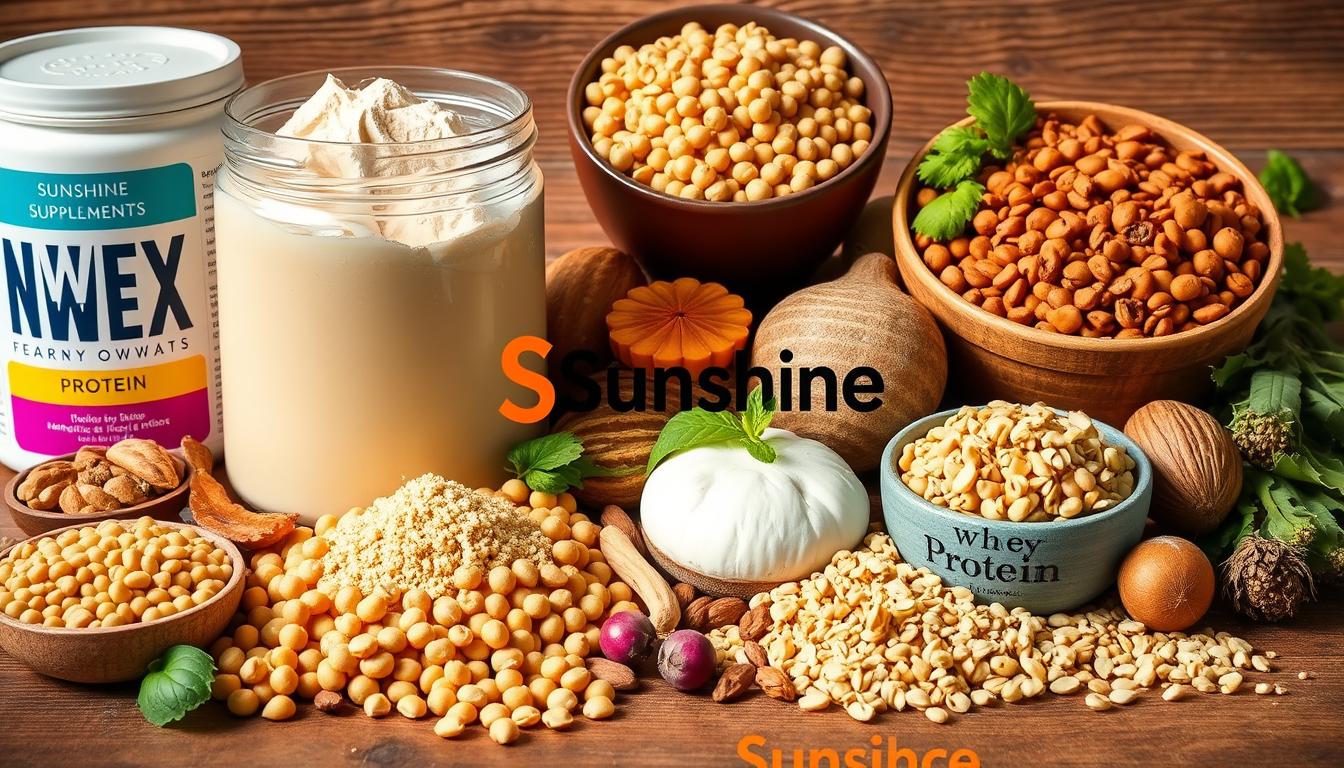Did you know whey protein can have up to 89% protein? Whey isolates and hydrolysates have even more, at least 90%. This shows how powerful whey protein is, making it a favorite among those who work out and care about their health. But, with more people choosing plant-based diets, there’s a growing interest in plant proteins too. So, should you pick whey or plant-based protein? Let’s look at the good and bad of each to help you decide what’s best for your health goals.
Key Takeaways
- Whey protein comes from milk and has all the amino acids you need. Plant proteins, like those from beans and almonds, come from plants.
- Plant proteins might need less land, water, and energy to make than animal proteins like whey.
- Whey protein is absorbed quickly and helps build muscle. Plant proteins, on the other hand, have more vitamins, minerals, and antioxidants.
- Both whey and plant proteins can help build muscle and improve health. But, it depends on what you prefer and your diet.
- Plant proteins are great for vegans and vegetarians. But, whey protein isn’t good for those with dairy allergies or intolerances.
Understanding Protein Basics and Daily Requirements
Protein is key for your health and well-being. It helps with growth, development, and body functions. Adults need about 0.8 grams of protein for every kilogram of body weight each day. So, a 150-pound person should aim for around 54 grams of protein daily.
Recommended Daily Protein Intake
The daily protein needs can change based on your age, activity level, and health. For example, athletes might need 1.2 to 2.0 grams of protein per kilogram of body weight daily. This helps them perform better and keep their muscles strong. If you’re trying to lose weight but keep your muscle, you might need 2.3 to 3.1 grams per kilogram of body weight daily.
Role of Protein in Body Functions
Protein is vital for many body functions, including:
- Growth and Repair: It’s essential for growing and repairing tissues like muscles, bones, and skin.
- Immune Function: Protein boosts the immune system, helping fight off infections and illnesses.
- Hormone Production: Certain proteins are needed for hormone production, which controls various body processes.
- Energy Production: When carbs and fats are low, protein can be used for energy.
Impact on Weight Management and Muscle Growth
Eating enough high-quality protein can help with weight management and muscle growth. It can make you feel fuller, aiding in weight loss. Also, protein is vital for building and keeping muscle, which is important for health and fitness.
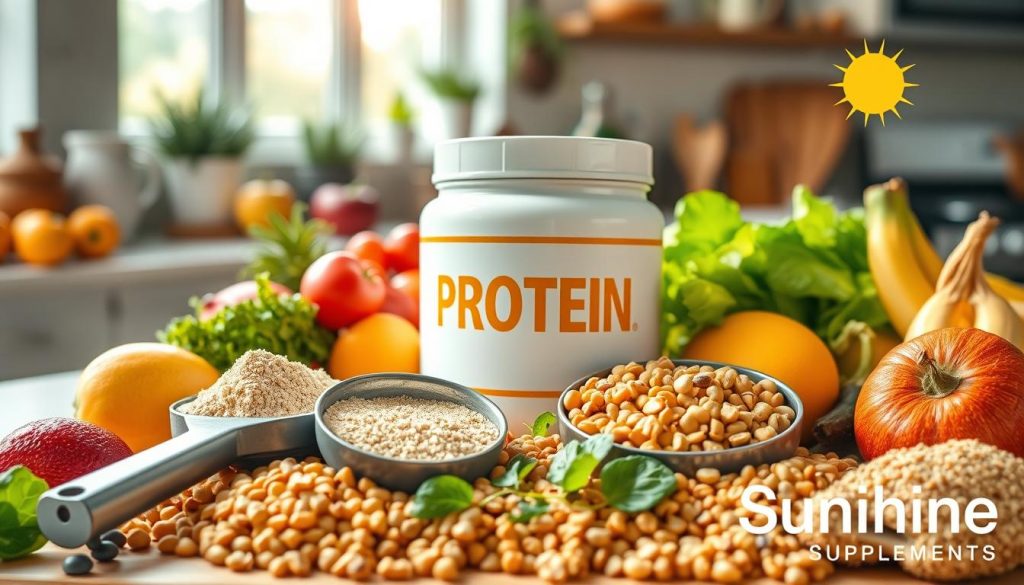
What Is Whey Protein: Source and Production
Whey protein comes from milk during cheesemaking. Enzymes split the milk into curds and whey. The whey is then turned into a whey protein powder, full of branch-chain amino acids (BCAAs) and easy to digest.
Whey protein comes in three types: concentrate, isolate, and hydrolysate. Each type has its own benefits and meets different needs and tastes.
| Whey Protein Form | Protein Content | Key Features |
|---|---|---|
| Concentrate | 25-89% | Higher in lactose and fat, more affordable |
| Isolate | ≥90% | Lower in lactose and fat, more refined |
| Hydrolysate | ≥90% | Pre-digested for faster absorption, may have a more bitter taste |
Whey protein is loved by athletes and fitness fans for its quality and quick absorption. But, it’s not good for those with dairy allergies or intolerances.
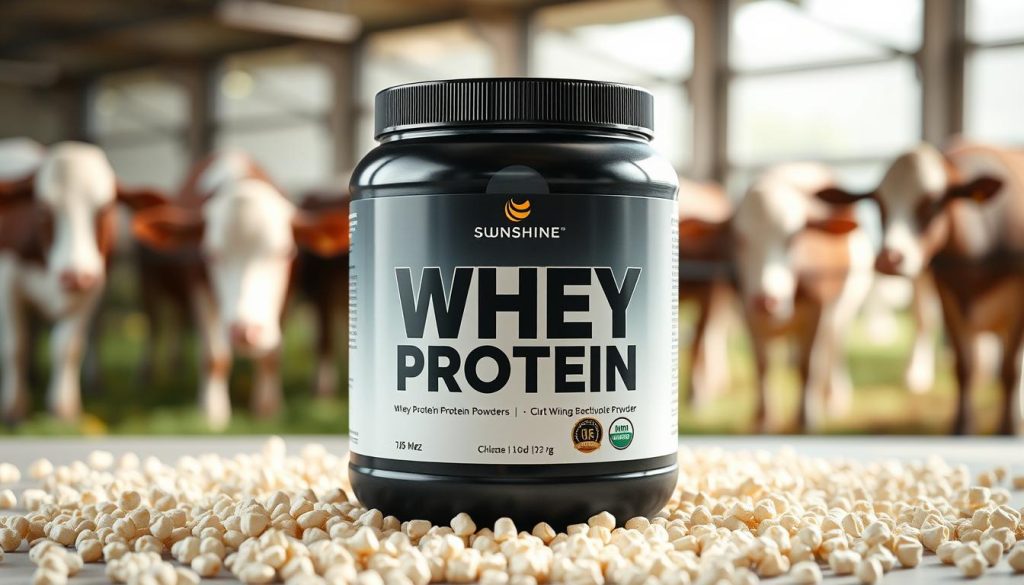
“Whey protein is a high-quality, dairy-derived supplement that provides a complete set of essential amino acids. It’s a great addition to a healthy diet.”
Plant Protein Fundamentals and Sources
Plant-based proteins are becoming more popular for health reasons. They are a sustainable and flexible choice. They suit many diets, including vegan and vegetarian ones.
Common Plant Protein Sources
- Soy
- Pea
- Hemp
- Beans
- Lentils
- Nuts and seeds
- Grains
Each plant-based protein source has its own amino acid mix. This mix offers many health benefits. Mixing different plant proteins can make complete powders. These powders have all the amino acids needed for muscle repair.
Production Methods
Making plant-based proteins involves extracting and processing plant materials. The methods depend on the plant type. They aim to keep the protein’s nutritional value high.
Sustainability Aspects
Plant-based proteins are better for the environment than animal proteins. They need less land, water, and energy. This makes them a good choice for those wanting to lower their carbon footprint.
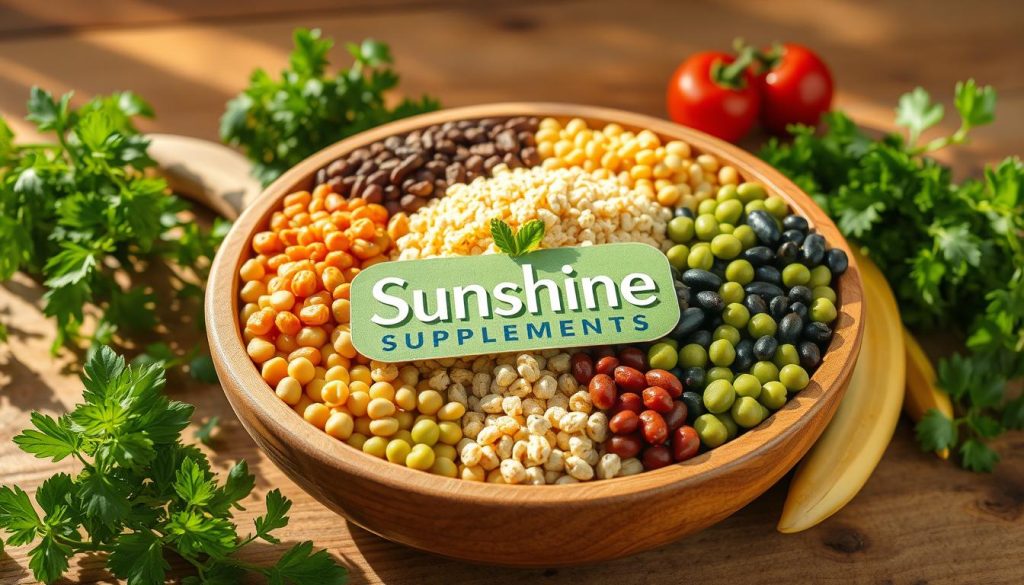
“Eating plant-based proteins may also help your heart and reduce inflammation.”
| Plant Protein Source | Protein Content (per 100g) | Sustainability Impact |
|---|---|---|
| Pea Protein | 80-90g | Low water and land use, low greenhouse gas emissions |
| Soy Protein | 36-56g | Moderate water and land use, moderate greenhouse gas emissions |
| Hemp Protein | 45-50g | Low water and land use, low greenhouse gas emissions |
Nutritional Composition and Amino Acid Profiles
Whey and plant-based proteins have their own benefits. Whey is a complete protein with all nine essential amino acids. It’s rich in leucine, key for muscle growth and recovery.
Plant-based proteins might miss one or more essential amino acids from a single source. But mixing different plant proteins, like pea, soy, or rice, can fill in the gaps. This makes them great for vegans or those on a plant-based diet.
Whey protein has more protein per serving, but plant proteins offer more fiber, vitamins, minerals, and antioxidants. For instance, pea protein is rich in iron, vital for carrying oxygen and energy.
| Nutritional Feature | Whey Protein | Plant Protein |
|---|---|---|
| Protein Content | Higher (23-26 g per serving) | Slightly lower (20-25 g per serving) |
| Amino Acid Profile | Complete with all essential amino acids | May lack one or more essential amino acids, but can be complemented |
| Micronutrients | Higher in calcium and potassium | Higher in fiber, vitamins, minerals, and antioxidants |
| Digestibility | Highly digestible | Slightly less digestible, but gentle on the digestive system |
Both whey and plant-based proteins have their own benefits. Your choice depends on your diet, health goals, and personal preferences.
Whey Protein vs. Plant Protein: Direct Comparison
Both whey and plant-based proteins have their own benefits. Knowing the differences helps you choose the right one for your diet and fitness goals.
Protein Content and Quality
Whey protein has more protein per serving than plant-based proteins. Whey concentrate has 70-80% protein, while isolate can be up to 95%. Plant proteins, like pea and hemp, have about 80% protein.
Whey protein is a complete protein, meaning it has all essential amino acids. Plant proteins can also be complete if mixed right.
Digestibility and Absorption
Whey protein digests and absorbs quickly, perfect for post-workout recovery. Plant proteins digest a bit slower but are effective in muscle repair.
- Whey protein is highly bioavailable, boosting muscle protein synthesis fast.
- Plant proteins, like pea and brown rice, digest slower but release amino acids for muscle repair.
Cost and Accessibility
Whey protein used to be cheaper and easier to find. But, plant-based options are now more affordable and accessible due to their growing popularity.
| Attribute | Whey Protein | Plant Protein |
|---|---|---|
| Protein Content | 70-95% protein by weight | ~80% protein by weight |
| Protein Quality | Complete protein | Can be complete with strategic blends |
| Digestibility | Rapidly digested and absorbed | Slightly slower digestion, sustained release |
| Cost and Accessibility | Widely available, often more affordable | Growing accessibility, competitive pricing |
Both whey and plant-based protein powder are great for a balanced dietary supplement routine. It depends on your personal needs and preferences.
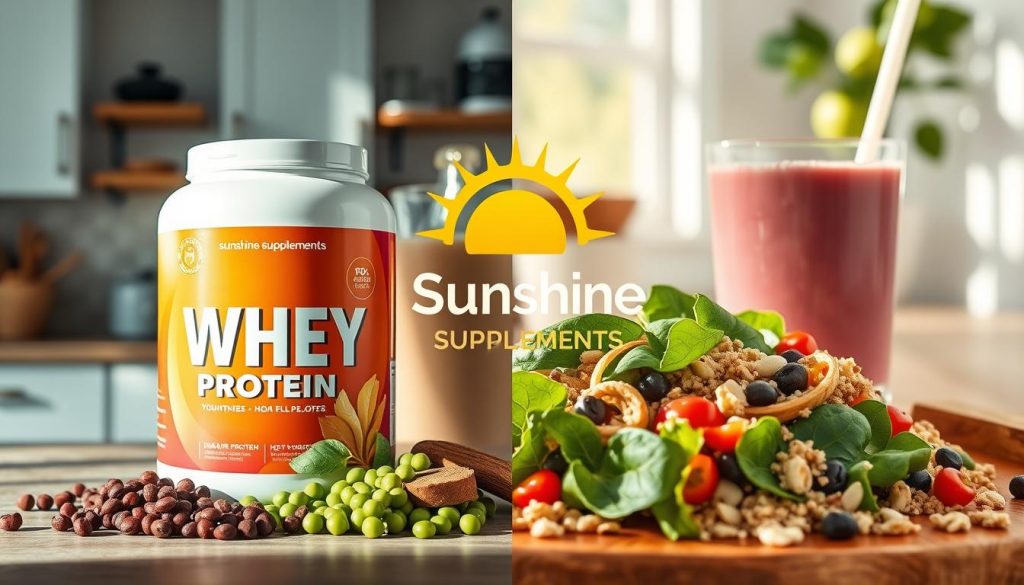
Health Benefits and Possible Drawbacks
Whey and plant proteins both have great health benefits. They are good for building muscle, managing weight, and overall health. Whey protein is a big hit in sports nutrition, helping with muscle growth and recovery. Plant proteins might lower heart disease risk and help with weight, thanks to their fiber and nutrients.
Plant proteins are great for people with dairy allergies because they are hypoallergenic. They also need less water, land, and produce fewer greenhouse gases than whey. This makes them a greener choice.
Whey protein has all the amino acids your body needs, including BCAAs for muscle repair. But, plant proteins can also be made complete by mixing different vegan sources. Studies show plant proteins like soy, pea, and wheat work just as well as whey for muscle recovery.
| Health Benefits | Potential Drawbacks |
|---|---|
|
|
Both whey and plant proteins have their own benefits. They can help with muscle building and weight management. Your choice depends on your diet, preferences, and lifestyle.
Special Dietary Considerations and Restrictions
Choosing the right protein supplement is key. Whey protein might not work for everyone, like those with dairy allergies or who follow vegan and vegetarian diets. Plant-based proteins, on the other hand, are great for many people.
Allergies and Intolerances
Whey protein isn’t good for people with dairy allergies or lactose intolerance because it comes from milk. Plant-based proteins, like those from vegan protein sources like pea, hemp, or soy, are better. They are easy to digest and don’t have dairy issues.
Vegan and Vegetarian Diets
Vegans and vegetarians looking for dietary supplements can use plant-based proteins. These protein sources are dairy-free. They also fit with the values of plant-based living.
Athletic Performance Needs
Whey and plant-based proteins both help with athletic performance and muscle growth. Whey is known for quick muscle repair. But, plant-based proteins are getting better in amino acids and effectiveness. Your choice depends on your diet, health, and fitness goals.
Choosing between whey and plant-based protein depends on personal factors. This includes diet, health, and fitness goals. Knowing the benefits and considerations of each helps you make the best choice for you.
Best Uses and Applications
Whey protein and plant protein powders are great for different needs. They help increase protein, aid in muscle recovery, or boost meal nutrition. These supplements fit easily into your daily routine.
Whey protein is loved for its mild taste and easy mix. It’s perfect for smoothies, shakes, and even baked goods. Its fast absorption helps muscles recover after workouts, supporting growth.
Plant-based proteins bring unique flavors and textures to your meals. Options like pea and soy protein suit many diets, including vegan and vegetarian.
Both whey and plant protein can be used as meal replacements, snacks, or to increase daily protein. Your choice depends on your needs, diet, and health goals.
“Incorporating both whey and plant-based proteins into your diet can provide a well-rounded approach to meeting your protein requirements and supporting your overall wellness.”
Knowing the benefits of each protein type helps you choose the best for you. This ensures you meet your nutritional needs and fit your lifestyle.
Conclusion
Both whey and plant-based proteins have great benefits for your health and fitness. Whey might have a slight advantage in amino acids and how quickly it’s absorbed. But, plant-based proteins bring extra nutrients and are better for the planet.
The right choice for you depends on your diet, health goals, and what you like. If you have allergies, plant-based might be better. But, whey is good for building muscle. Research shows plant-based can also help with muscle growth.
Always talk to a healthcare expert or dietitian before choosing a protein supplement. They can help you find the right balance of protein. This ensures you meet your dietary needs and reach your wellness goals, whether with whey, plant-based, or a mix.
